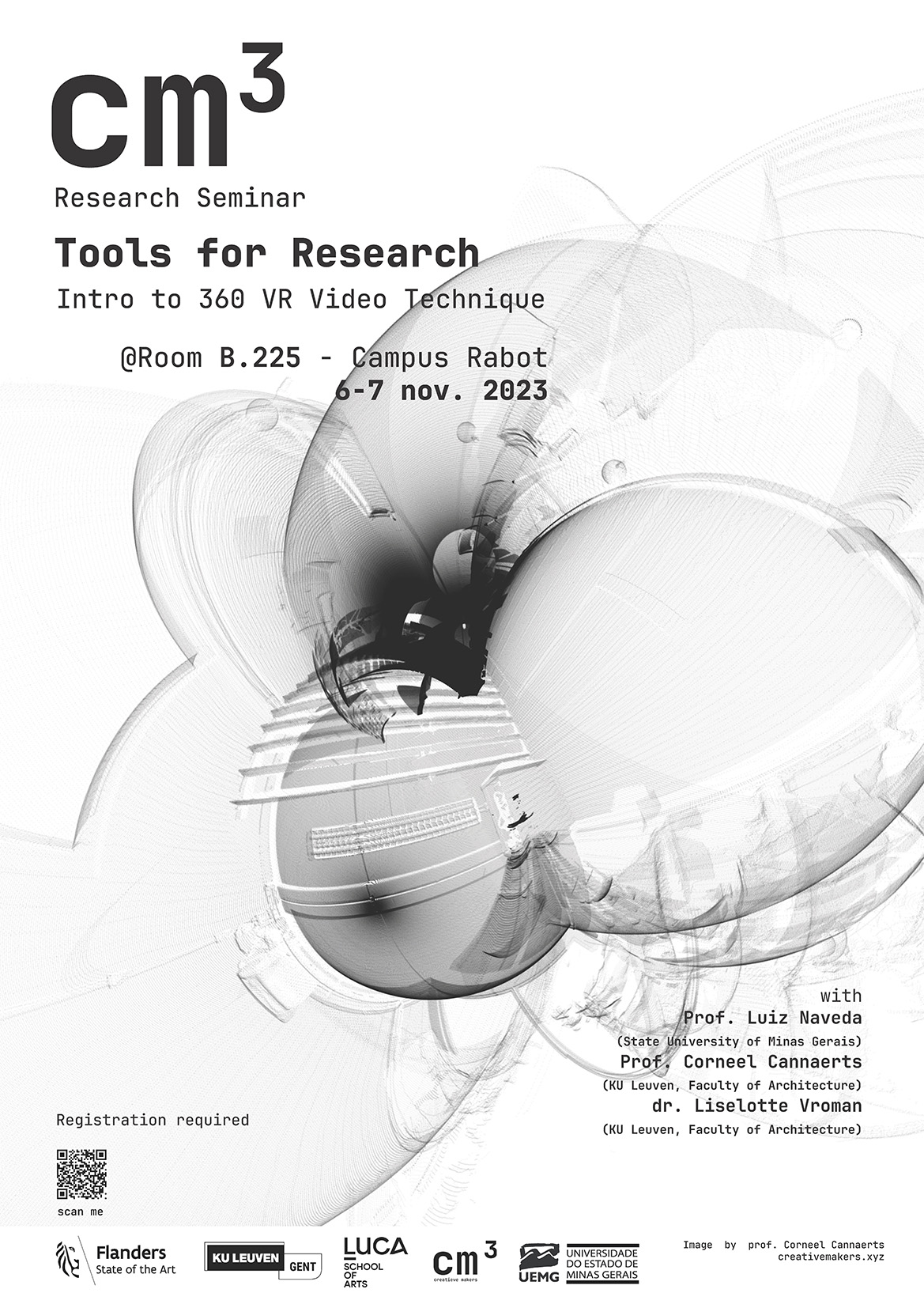Intro to 360 VR Video Technique
@Room B.225 – Campus Rabot
6-7 nov. 2023
with
Prof. Luiz Naveda (State University of Minas Gerais)
Prof. Corneel Cannaerts (KU Leuven, Faculty of Architecture)
dr. Liselotte Vroman (KU Leuven, Faculty of Architecture)
Registration required (please scan the QR code or use this link)
Content
The CM³ research seminar is a two-day event organized by CM³Lab (https://creativemakers.xyz), a digital maker space that brings together three disciplines: Architecture, Engineering Technology, and Arts. The seminar serves as a platform for exploring and discussing the application of digital tools and emerging technologies, more particularly on 360 VR video for research within these fields. It aims to promote interdisciplinary collaboration, knowledge exchange, and hands-on experiences through a workshop, presentation and discussion. Researchers interested in these disciplines are invited to participate to engage in discussions, share insights, and explore innovative approaches to research and creative endeavours.
360° Virtual Reality (VR)
The advent of 360° Virtual Reality (VR) video technology has shifted the domains of visual storytelling for many areas of research. This medium affords an unprecedented opportunity for researchers, ethnographers and artists to capture an immersive and rich view of environments, people, contexts and experiments. Unlike traditional two-dimensional video, 360° VR video captures an immersive panorama of the surrounding environment, enabling viewers to engage with the content in a completely different way. As such it has gained significant attention within the fields of anthropology, ethnography, and the arts due to its capacity to produce deeper and more visceral comprehension of the subject matter. In this seminar, we will experience several 360° VR video approaches to documentation and artistic expression, shedding light on its potential and limits. The seminar will comprise introductory elements to understand the concepts, discussion, literature and practices involving video capture and post-processing procedures. The aim is to provide researchers with a fundamental understanding to plan and realise small 360° VR video projects using mobile platforms and intermediary cameras.
Programme
- day 1 – 6th of November
14 -17h: Introduction to CM3 Lab + 360 VR
- day 2 – 7th of November
10-12h30: Explore 360 VR
14 -17h: Process 360 VR
Target audience:
Researchers of the field of Architecture, Art, and Engineering Technology.
Learning Objectives
1 Introduce the technical aspects of creating and distributing 360° VR content, including camera technology (consumer level), simple post-production techniques and distribution platforms using mobile platforms and computers.
2 Understand the characteristics and the experience of 360° VR video in the field, by considering the position of the camera, visibility of the subject and crew, camera movement, post-processing demands, possibilities and limits of the technology.
3 Design documentation strategies to record spaces, and movement of people, including ethnographic fieldwork, documentation of cultural practices and rituals, experiments and inspection of spaces.
4 Explore creative uses of recording and post-processing techniques to produce creative videos for art, communication and dissemination of knowledge, in relation to music, movement and media formats.
Speakers:
- Luiz Naveda (State University of Minas Gerais)
Luiz Naveda is professor at the State University of Minas Gerais (Brazil). He holds a technical degree in electronics (1994) a bachelor in music (UEMG, 1999) and a master in music performance (UFMG, 2002). During his doctoral and postdoctoral studies in Musicology at Ghent university (2011, promoter: Marc Leman) he worked on the connections between music and dance in the Afro-Brazilian Samba. In the last years, he has published on a range of topics that include musical gesture, dance studies, timing and microtiming, music education, computer music, interactive systems, among others. Luiz also works as an independent artist, in consulting and development of software and hardware for interactive and musical applications, art installations and music research. More information at http://naveda.info.
- Corneel Cannaerts (KU Leuven, Faculty of Architecture)
Corneel Cannaerts is an architect and postdoctoral researcher, interested in the impact of emerging technologies on the culture and practice of architecture. He has obtained a Master’s in Architectural Engineering from the University of Ghent and a PhD in Architecture from SIAL / RMIT University Melbourne. He is currently researching and lecturing at the Faculty of Architecture. He was a guest researcher at the Architectural Robotics and Computation Lab of the Aarhus School of Architecture. His research and work have been presented, published and exhibited and he has lectured and taught workshops internationally. He has co-founded MMlab, a digital fabrication lab at KU Leuven Faculty of Architecture, and is a member of the fieldstations network, a non-profit organization exploring models for architecture in the Anthropocene and the technosphere.
- Liselotte Vroman (KU Leuven, Faculty of Architecture)
Liselotte Vroman is an architect and postdoctoral researcher at the Faculty of Architecture of KU Leuven. She obtained her Master’s degree in Architecture in 2010 from the Hogeschool voor Wetenschap en Kunst, Sint-Lucas Brussels. After graduating, she worked as an independent architect for 5 years (2010 -2015). In the summer of 2021, she completed her interdisciplinary doctoral project entitled “Make Room for Play; Questioning the Role of the Moving Body between Thinking and Making”. She is involved in several interdisciplinary projects. As a member of the research group “The Drawing and The Space”, she studies creative processes and the role of drawing within those processes. Moreover, she teaches several practical courses and workshops on the sensory body.
Image by prof. Corneel Cannaerts

